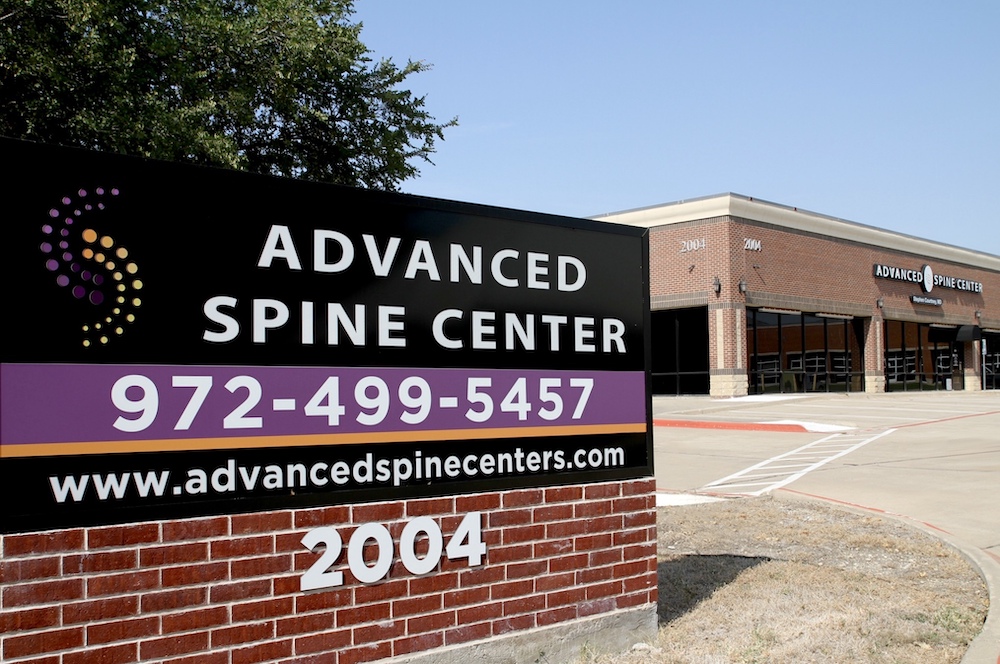Lumbar Revision Surgery Frisco, TX
Home > Orthopedic Spine Surgeon in Frisco, TX > Lumbar Revision Surgery Frisco, TX
Specialties
When lumbar spine surgeries fall short of their intended goals, leaving individuals with persistent pain, limited mobility, or complications, lumbar revision surgery becomes a beacon of hope. If you have chronic, severe, or shooting pain after your first surgery, you may be a candidate for lumbar revision surgery.
At the Advanced Spine Center, we offer a wide variety of surgical treatment options for patients with failed back surgeries and progressive degeneration. To learn more about how we can help your pain, please call our office at 972-499-5457 today.
What Is a Lumbar Revision Surgery?

Lumbar revision surgery, also known as revision spine surgery or lumbar reoperation, is a complex medical procedure performed to correct or improve the outcomes of a previous lumbar spine surgery that did not achieve the desired results.
This specialized surgical intervention targets the lumbar region of the spine, which encompasses the lower back, with the primary aim of alleviating persistent pain, restoring mobility, and addressing any complications or failures resulting from prior spinal surgeries.
When Do We Recommend Lumbar Revision Surgery?
Many patients undergo initial surgery for issues like spinal stenosis, back pain, and radiating leg pain. They may undergo spinal fusion surgery, a microdiscectomy, or another procedure aimed at treating back pain.
Lumbar revision surgery is typically recommended when patients experience persistent or worsening symptoms following a previous lumbar spine surgery. Common indications for this procedure include the following.
- Inadequate pain relief: Patients who continue to experience severe back pain, leg pain (sciatica), or both despite prior surgical interventions may be candidates for lumbar revision surgery.
- Failed fusion or other complications: Revision surgery becomes necessary when complications such as pseudoarthrosis (failed fusion), hardware failure, or infection occur after the initial lumbar fusion surgery.
- Recurring herniated discs: If a patient develops a recurrent disc herniation at the same lumbar level where a previous discectomy was performed, revision surgery may be considered.
- Adjacent segment disease (ASD): In some cases, degeneration of the spinal segments adjacent to the previously operated area may occur, necessitating further surgical intervention.
- Continued neurological symptoms: Patients with ongoing neurological symptoms like weakness, numbness, or bladder/bowel dysfunction may require revision surgery to decompress the affected nerves.
How Common Are Lumbar Revision Surgeries?
Lumbar revision surgeries are not as common as initial lumbar spinal fusion surgeries, but they are becoming more prevalent due to the increasing number of primary spine surgeries being performed. The exact prevalence varies depending on factors such as the type of initial surgery, patient demographics, and the success rates of the primary surgery.
What Are the Types of Lumbar Revision?
Lumbar revision spine surgeries can encompass a range of procedures, each tailored to the specific needs of the patient. The primary types of lumbar revision surgeries include the following.
- Revision surgery for failed lumbar fusion:
- Posterolateral fusion: In cases where the initial fusion did not achieve proper spinal stabilization, a posterolateral fusion may be performed to fuse the affected vertebrae together successfully.
- Interbody fusion: Interbody fusion techniques, such as anterior lumbar interbody fusion (ALIF) or transforaminal lumbar interbody fusion (TLIF), may be utilized to address failed fusion or complications from the previous surgery.
- Decompression surgery: Revision decompression surgery involves removing tissue, bone, or hardware that may be impinging on nerves and causing pain or neurological deficits.
- Adjacent segment surgery: When adjacent segment disease occurs, revision surgery may involve stabilizing or fusing the segments above or below the previous surgery site to alleviate symptoms and prevent further degeneration.
- Hardware removal and replacement: In cases of hardware failure or complications, the removal and replacement of spinal instrumentation may be necessary.
Revision Surgery for Failed Lumbar Fusion
If a lumbar spinal fusion, discectomy, or other surgery fails to relieve a patient’s pain and produce the desired results, it can be considered a failed spine surgery. If a spinal surgery fails, or if the spine’s condition degrades further, revision spine surgery may be the best treatment option for the patient.
What Is Failed Back Surgery Syndrome (FBSS)?
Failed Back Surgery Syndrome (FBSS) is a term used to describe the persistence or recurrence of pain and disability following lumbar spine surgery. FBSS can be a complex and challenging condition to manage, often requiring revision surgery to address the underlying issues. It may result from hardware failure, surgical error, or other complications.
Why Might a Previous Spine Surgery Fail?
Sometimes, spine surgery may fail and cause the necessity for a revision procedure. Several factors can contribute to the failure of a previous lumbar spine surgery, including the following.
- Incorrect or inadequate diagnosis: Misdiagnosis or incomplete understanding of the patient’s condition can lead to an ineffective surgical approach.
- Surgical errors: Surgeon-related factors such as improper surgical technique, inadequate decompression, or insufficient fusion can contribute to surgical failure.
- Patient factors: Patient-related factors such as smoking, obesity, or failure to follow postoperative instructions can negatively impact surgical outcomes.
- Spinal degeneration: The natural progression of spinal degeneration or the development of adjacent segment disease can lead to recurrent symptoms.
- Other complications: Postoperative complications like infection, bone graft failure, pseudarthrosis, or failure to heal properly can necessitate revision surgery.
How to Fix a Failed Back Surgery
If your first surgery fails, your doctor will carefully evaluate the reasons for the failure. Some cases may not require a second surgical procedure, but many do. The approach to fixing a failed back surgery depends on the specific problems encountered and the patient’s individual needs.
When addressing your failed back surgery syndrome, your surgeon may take the following steps.
- Evaluation: A thorough evaluation, including advanced imaging studies, is crucial to identify the cause of the surgical failure and determine the most appropriate revision strategy.
- Non-surgical intervention: In some cases, non-surgical treatments such as physical therapy, pain management, and lifestyle modifications may be considered as part of the treatment plan.
- Multidisciplinary approach: Collaboration between various healthcare professionals, including spine surgeons, physical therapists, and pain management specialists, can provide a holistic approach to managing a failed back surgery.
- Revision spine surgery: Revision surgery may involve removing or replacing hardware, revising the fusion, addressing adjacent segment disease, or addressing nerve compression to alleviate symptoms.
How Can I Prepare for Lumbar Revision?
Preparing for lumbar revision surgery requires careful consideration and planning. This is true for any surgical procedure. Before deciding to undergo revision spine surgery, we strongly recommend speaking with an orthopedic spine surgeon in Frisco. They can carefully evaluate your condition, discuss your treatment options, and determine if revision spinal surgery is actually necessary.
Undergo a comprehensive medical evaluation, including imaging studies and diagnostic tests, to assess your overall health and identify any underlying medical issues. These imaging tests may include magnetic resonance imaging (MRI) or computed tomography (CT) scans.
Have an open and honest discussion with your surgeon about your expectations, the potential risks, benefits, and alternatives to revision surgery.
Ensure you have a support system in place to help with post-surgery recovery, as you may require assistance with daily activities during your rehabilitation.
Adhere to your surgeon’s preoperative instructions, which may include dietary restrictions, medication adjustments, and cessation of smoking, if applicable.
What Can I Expect During Lumbar Revision Surgery?
Lumbar revision surgery is a complex procedure that varies depending on the specific issues being addressed. It can also vary depending on the surgical approach used by the surgeon. Generally, patients can expect the following from a revision surgical procedure.
- Anesthesia: You will receive anesthesia to ensure you are comfortable and pain-free during the surgery. Your anesthesia type will be discussed with you before the procedure.
- Surgical approach: The surgeon will make an incision at the surgical site to access the spinal canal. The choice of surgical approach (anterior, posterior, or lateral) will depend on the nature of the revision surgery. The surgeon will perform the necessary revision procedures, which may include decompression, fusion, hardware removal or replacement, and other techniques tailored to your condition.
- Intraoperative monitoring: Intraoperative monitoring, including nerve monitoring and imaging, may be used to ensure the safety and accuracy of the surgery.
- Closure: After completing the revision procedures, the surgeon will close the incision with sutures or staples and apply a sterile dressing.
Recovery After Lumbar Revision Surgery

Recovery after lumbar revision surgery is a gradual process that requires patience and commitment to follow postoperative guidelines. By following your surgeon’s instructions, you can decrease the risk of complications and promote proper healing.
How Long Will It Take to Recover from Revision Spine Surgery?
The recovery duration can vary widely depending on the complexity of the revision surgery, individual patient factors, and the specific procedures performed. Revision spine surgery is a delicate process with a delicate recovery. As a result, adhering to your surgeon’s postoperative instructions is crucial to help your body heal properly.
A general timeline of revision spine surgery recovery should look something like the following.
- Immediate postoperative period: You will spend some time in the recovery area, closely monitored by medical staff, to ensure your vital signs are stable.
- Hospital stay: Depending on the extent of the surgery, you may stay in the hospital for a few days to a week.
- Rehabilitation: Physical therapy and rehabilitation exercises will be initiated to improve strength and mobility. Your surgeon will determine the timing of these exercises. Most physical therapy begins within a few weeks after the surgery.
- Follow-up appointments: Regular follow-up appointments with your surgeon will be scheduled to monitor your progress and address any concerns. It is important to attend these appointments so your surgeon can monitor your healing.
- Full recovery: Many patients can resume their normal activities around six months after their surgery. However, full recovery may take up to a year, possibly longer. Your surgeon can give you a better idea of how long your recovery may last.
Who Is a Good Candidate for Lumbar Revision Spine Surgery?
Determining whether you are a suitable candidate for lumbar revision surgery is a collaborative decision between you and your spine specialist. If you underwent a prior surgery that failed, you may be a candidate for revision spine surgery. Potential candidates for revision spine surgery usually:
- Have persistent or worsening symptoms: Candidates should continue to experience pain, neurological deficits, or other symptoms despite conservative treatments and previous lumbar surgery.
- Have diagnosable issues: The cause of the ongoing symptoms should be diagnosable, and the surgical approach should have a reasonable likelihood of addressing those issues.
- Are medically fit: Candidates should be in reasonably good health to undergo surgery, with medical conditions well managed.
- Understand risks and benefits: Candidates should have realistic expectations about the potential outcomes and be aware of the risks associated with the procedure.
- Commit to rehabilitation: Commitment to postoperative rehabilitation and lifestyle modifications is essential for a successful outcome.
What Are the Potential Risks and Complications of Lumbar Revision Spinal Surgery?
Like any surgical procedure, lumbar revision surgery carries inherent risks and potential complications. These risks may include the following.
- Infection
- Excessive bleeding
- Nerve or spinal cord damage
- Hardware issues
- Pseudoarthritis
- Dural tear
- Blood clots
- Scar tissue formation
- Spinal deformity
- Spinal instability
- Adjacent segment degeneration
- Anesthesia complications
Contact the Advanced Spine Center for Lumbar Revision Surgery in Frisco, TX
Sometimes, spine surgery may fail. Lumbar revision surgery is a specialized procedure designed to address the complexities and challenges associated with failed or suboptimal lumbar spine surgeries. When recommended by a qualified spine specialist, it offers hope for improved pain relief, enhanced mobility, and a better quality of life for individuals who have experienced ongoing discomfort and disability after a previous surgery.
If you suffer from chronic pain after a failed spine surgery, consider revision spine surgery. At the Advanced Spine Center, Dr. Courtney is an orthopedic spine surgeon with over 20 years of experience. He has helped countless patients address and treat their chronic back pain, spinal stenosis, pinched nerves, and other issues. To schedule an appointment, please call 972-499-5457 today.


